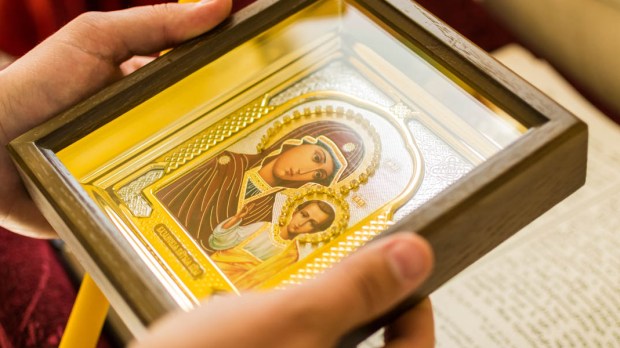From the very beginning, Christians have created pictorial representations of God and the saints for use during personal and public prayer. It was seen as a way to enhance a person’s prayer, giving a visual medium to meditate on while conversing with God.
The first icons — a word that comes from the Greek word eikōn, meaning “image” — were painted in a Byzantine style popular in the early centuries of the Church. Over the centuries, this style has been retained and formalized into an artistic language, in which every part of the icon — colors, figures, clothing, hand gestures, objects, and lettering — has a specific meaning.
These images are traditionally less realistic and more symbolic in nature. They are often called “windows into Heaven,” and are designed with that goal in mind. The artist does not want the Christian to admire the icon as a beautiful piece of artwork, but to use it to be drawn into prayer, raising the mind and heart to God. This helps explain why icons are not signed by the artist (also called the “writer”), as modern-day paintings are. The artist does not want to be praised for his or her talents, but to help facilitate an encounter with God.
The Catechism of the Catholic Church supports the practice of using icons during prayer, explaining, “Christian iconography expresses in images the same Gospel message that Scripture communicates by words. Image and word illuminate each other” (CCC 1160).
How to pray with icons
First of all, find an icon of Jesus, Mary, or one of the saints. If possible, light a candle or burn some incense nearby. This can further enhance the atmosphere of prayer, engaging all the senses. Then, simply gaze at the icon.
Many spiritual writers explain that praying with icons is a receptive experience, where we gaze into heaven and allow God to touch our heart.
It is important to simply look at the icon and notice the various details and colors. An icon is often called a “theology of colors” and can teach us a great deal about the Christian faith. Everything in the icon is symbolic and points to some spiritual truth about God. If the subject of the icon is a saint, there are typically various symbols that create a “spiritual portrait” of the saint, reflecting attributes or events that contributed to the person’s holiness.
The gold background is a reminder of the presence of God and his uncreated light. It is an invitation to enter his presence and be taken up into a spiritual realm of beauty.
Listening is an important part of praying with icons as it allows us to hear the word of God and what he desires to speak to us. It reinforces the reality that prayer is essentially a conversation where we deepen our love of God.
When looking at the icon, remain silent and still and recognize where your eye is drawn. What effect does the color have on you? What feelings does the icon stir up?
Notice the eyes of the individual in the icon. Often the eyes are looking back at us. Let the eyes of Jesus, Mary, or one of the saints penetrate your soul. What are they trying to tell you?
Take as much time as you need with the icon. At first, try spending 10 or 15 minutes with the icon. This type of prayer requires a contemplative heart, one that slows down, taking a break from the fast-paced society that we live in.
After sufficient time has passed, thank God for the opportunity to be with him and store the icon in a suitable place. Praying with icons can be a beautiful experience, one that can be repeated each and every day.

